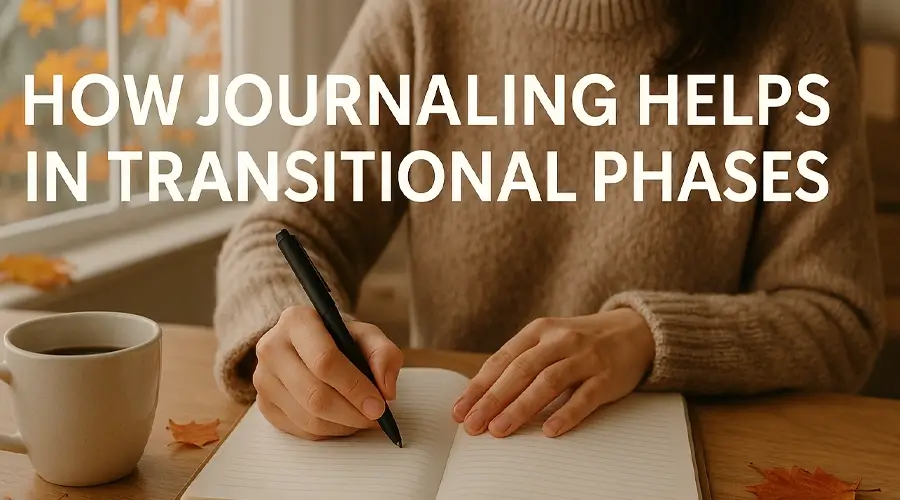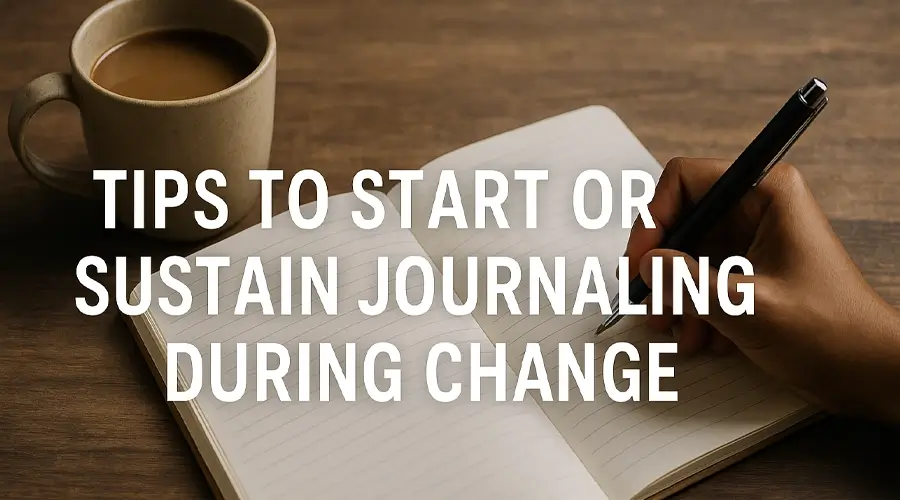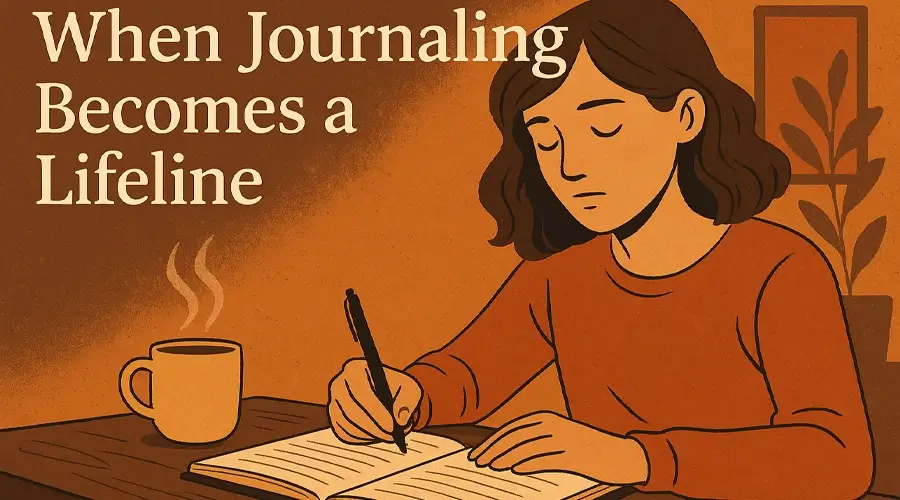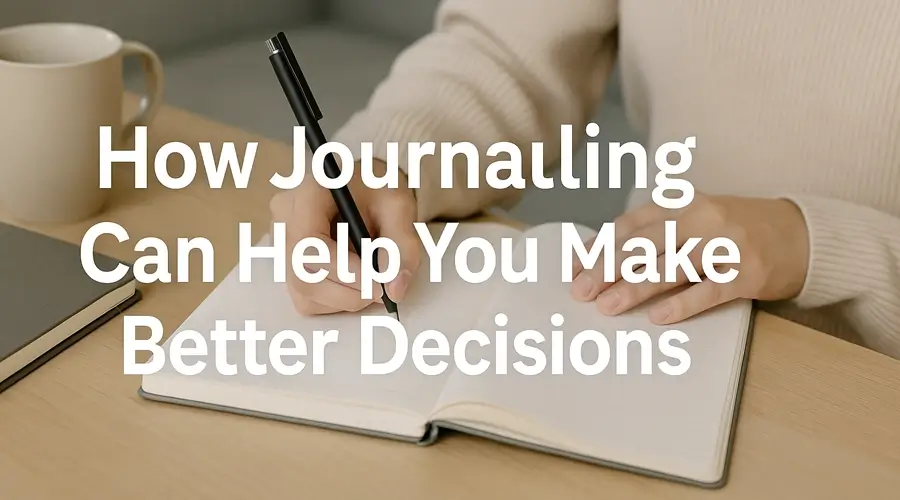Life transitions rarely arrive quietly. Whether it’s the end of a relationship, the start of a new job, a cross-country move, or becoming a parent—these moments often come with a swirl of emotions: uncertainty, grief, hope, excitement, and fear, all tangled together. The emotional turbulence can feel overwhelming, even paralyzing.
But what if you had a tool—not to escape the chaos—but to move through it with clarity and strength?
That’s where journaling through life transitions becomes more than just reflection; it becomes transformation. Unlike casual diary entries, this form of journaling acts as a structured yet deeply personal space to process big changes. It’s where emotions are named, thoughts are untangled, and your evolving story begins to make sense.
In essence, journaling through life transitions means using writing as a grounding tool during pivotal moments. It’s not about documenting every detail—it’s about anchoring yourself when everything else is shifting.
Understanding Life Transitions
Not all life transitions come with a warning. Some arrive with celebration—graduating, getting married, landing a dream job. Others show up uninvited—divorce, layoffs, the loss of a loved one. But whether they’re joyful or painful, planned or sudden, all transitions share one trait: they disrupt the version of life we once knew.
For people in their 20s to 40s, transitions often mark major identity shifts. You’re not just ending a relationship—you’re redefining who you are without it. You’re not just moving to a new city—you’re letting go of the rhythms, routines, and relationships that made the old one feel like home.
And this emotional weight? It doesn’t always get lighter with time. In fact, when left unprocessed, it can pile up—manifesting as anxiety, burnout, or a chronic sense of being stuck.
That’s why traditional advice like “stay strong” or “just give it time” often falls short. These shifts deserve more than surface-level coping. They need intentional processing, and journaling through life transitions gives you just that—a safe, private space to understand what’s really happening beneath the surface.
How Journaling Helps in Transitional Phases
Journaling through life transitions isn’t about crafting the perfect narrative—it’s about giving yourself permission to be messy, honest, and real. In moments of change, when the external world feels uncertain, journaling creates an internal anchor.

Here’s how it helps:
1. Externalizes Inner Chaos
When emotions stay in your head, they tend to swirl in loops. But putting them on paper gives them shape. It turns the abstract into something tangible—anger, grief, confusion, hope—all now visible and manageable.
2. Provides Emotional Regulation
Writing slows you down. It invites you to pause and reflect instead of reacting. Over time, this simple habit improves emotional clarity and builds resilience, helping you respond with intention instead of impulse.
3. Reframes Your Narrative
Transitions often feel like endings—but they can also be beginnings. Journaling helps you shift the story from “I lost everything” to “I’m building something new.” It empowers you to take ownership of your experience.
4. Boosts Decision-Making
In uncertain times, making choices feels daunting. Journaling helps you untangle your priorities, fears, and needs. It doesn’t give you all the answers, but it makes the next step clearer.
At its core, journaling through life transitions is not a luxury—it’s a lifeline. One that helps you stay connected to your values, your emotions, and the quiet inner voice that often gets drowned out by change.
Different Journaling Styles for Different Transitions
Just like no two transitions are the same, no single journaling style fits everyone. The beauty of journaling through life transitions is its adaptability—it can shift to meet your emotional needs, energy level, and type of change.
Let’s explore how different styles can support specific life shifts:
Breakups or Emotional Losses: Prompt-Based Journaling
After a breakup or loss, the mind is flooded with questions, regrets, and “what-ifs.” Using journaling prompts like “What am I grieving?” or “What do I want to let go of today?” can help untangle emotions without drowning in them.
Career Changes or Burnout: Reflective Journaling
If you’re changing jobs, starting over, or feeling burned out, use reflective journaling to explore your values and goals. Questions like “What does success mean to me now?” or “What am I afraid of losing?” can spark clarity in uncertain times.
Moving or Relocation: Gratitude Journaling
Relocating often brings disorientation. Writing three simple things you’re grateful for each day can help reframe the experience and anchor you in your new surroundings. Gratitude journaling is a powerful antidote to overwhelm.
Grief or Deep Sadness: Expressive Journaling
When facing deep sorrow, sometimes structured formats don’t help. Expressive journaling invites raw, unfiltered emotion onto the page. You don’t need to make sense—you just need to release. Cry on the paper if you must.
Tips to Start or Sustain Journaling During Change
Starting a journaling habit during a life transition can feel overwhelming—especially when emotions are already heavy. But the goal isn’t perfection; it’s connection. Connection to your thoughts, to your emotions, and ultimately, to your sense of self.
Here are practical tips to help you begin—and keep going:
Start Small
You don’t need pages. You don’t even need paragraphs. Start with 5 minutes, 1 feeling, or 1 sentence. Small entries still carry weight.
Use Gentle Prompts
Instead of asking “What am I supposed to write?”, try inviting questions like:
-
“What emotion is loudest today?”
-
“What do I wish someone would tell me right now?”
These prompts reduce pressure and create flow.
Be Radically Honest
Your journal isn’t a highlight reel. It’s a truth space. The more honest you are—even if it’s messy or dark—the more healing power you unlock.
Go Beyond Words
If writing feels too much, try voice notes, drawings, or even typing in your notes app. Journaling through life transitions isn’t about format—it’s about expression.
Create a Ritual, Not a Rule
Tie your journaling to something you already do: morning coffee, winding down at night, or after a walk. Let it become a soft habit, not a rigid task.
Remember: you’re not journaling to be productive. You’re journaling to be present.

Common Roadblocks (and How to Overcome Them)
Even with the best intentions, journaling through life transitions can hit some speed bumps. That’s normal. Growth isn’t linear, and writing about emotional change can stir resistance.
Here are common challenges—and how to move past them with compassion:
“I Don’t Know What to Write”
You don’t have to. Just start with how you feel about not knowing what to write. That alone breaks the block. Describe the room, your mood, or your hesitation. The words will follow.
“This Feels Silly or Unproductive”
Journaling isn’t performance. It’s process. If it feels pointless, remember: the benefit isn’t in the page—it’s in the pause. It’s the few minutes you give your inner world to speak without being judged.
Emotional Discomfort
Sometimes writing brings up more pain than peace. That’s okay. Don’t force depth every time. Some days are for pouring out your soul, others are just check-ins. Let both exist.
Losing Momentum
It’s easy to stop when life gets busy. If that happens, don’t guilt yourself. Simply begin again. One line. One breath. Your journal isn’t keeping score—it’s keeping space for you.
When Journaling Becomes a Lifeline
Sometimes, the page becomes more than just paper. It becomes your confidant, your therapist, your mirror. In the thick of a life transition, when everything feels unstable, journaling through life transitions can become the thread that holds you together.
Here’s what that can look like in real life:
From Confusion to Clarity
Imagine someone going through a breakup, writing every night not to analyze, but just to survive. Over time, their entries shift—from anger, to sadness, to unexpected moments of self-compassion. Without even realizing it, they’re healing.

From Spiraling to Structure
A person burnt out from work starts journaling in bullet points: “What drained me today?” “What gave me energy?” These simple reflections slowly rebuild their self-awareness and boundaries.
From Feeling Lost to Finding Direction
Someone who’s relocated to a new city begins a nightly log—not just of their feelings, but of little wins: “Found a coffee shop I liked,” “Talked to a neighbor.” Their journal becomes a map of belonging.
These stories may be fictional, but the transformation isn’t. Journaling doesn’t fix everything, but it helps you remember who you are while you figure things out.
Conclusion: You Don’t Have to Navigate Change Alone
Life transitions are unavoidable—but feeling lost during them isn’t mandatory. When everything outside of you is shifting, journaling through life transitions offers a steady hand on your shoulder, a quiet space to exhale, and a record of your becoming.
You don’t need the right words. You don’t need to be consistent. You just need to show up—for yourself.
Try a 14-day journaling challenge. Set a timer for five minutes. Ask your heart a question. Listen.
Because even when the road feels uncertain, your journal can be the compass that leads you back home—to clarity, to healing, and most importantly, to you.
Ready to turn your thoughts into clarity? Start journaling with VERBOAI—your AI-powered companion for navigating major life transitions with ease, insight, and support.



